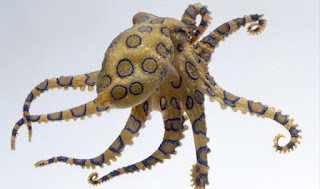The octopus is an intriguing creature of the seas that derives its name from a Greek word which means eight-footed. They are found in various parts of the oceans, most commonly in the coral reefs. These are intelligent animals that can distinguish between shapes and patterns ans also have observational learning abilities. To know more about some interesting octopus facts, scroll down...
If you are looking at a picture of the oceans, you definitely would not miss the octopus. This animal with eight arms, is one of the most intelligent creatures of the salty waters of the seas and oceans. They have a bulbous head with which they propel themselves as they swim, with their arms trailing behind like long tentacles. These arms are located around their mouth and have suckers on the underside. They use these arms and suckers to catch and choke their prey.
Octopuses vary in size as well as appearance. One of the many amusing octopus facts is that they use a number of different interesting modes of defense to escape their enemies. Here are some simple information about these sea creatures that can be used as octopus facts for preschoolers and kids as well.
Interesting Octopus Facts for Kids
Octopuses are boneless creatures. They don't have a vertebral column, that is, they are invertebrates. The beak which is in the shape of a parrot beak, is the only hard structure in their body. Due to this reason, their bodies are extremely flexible and they can squeeze through incredibly small spaces.
Life span of octopuses depends upon their type (species). It may vary from 6 months to a couple of years. The larger ones live longer than those that are smaller in size.
Octopuses are bottom dwellers. However, as they hatch from the eggs, the young ones swim to the surface. After floating on the surface with the planktons for about a month, they swim back to the sea bed.
Octopuses may live in holes or crevices of rocks. Some of them make a protective area for themselves by piling up rocks. The small Atlantic pygmy octopus is known to inhabit an empty clamshell.
Octopuses vary in size depending upon the species. While those found in tropical waters are small, octopuses of the colder seas are larger in size. The giant Pacific octopus is the largest amongst all the members of the group and are known to grow as large as 23 feet. However, most octopuses are smaller in size. Usually they grow up to 10 feet and weigh around 55 ponds. Females are smaller than the males.
An interesting octopus fact is that these sea creatures have three hearts. Two hearts pump blood through the gills whereas the third one pumps blood through rest of the body.
The color of octopus blood is blue.
The octopus is a predator. It hunts at night. Its favorite food are crabs, mollusks and crayfish.
Octopuses are stealth hunters. They change their color to merge with the surroundings and wait for the prey to pass by. As soon as the prey is close within reach, the octopus grabs it with its long arms. It then secretes a nerve poison that stuns the prey. Octopus venom is poisonous and in some cases it can be fatal for human beings as well.
Octopuses are preyed upon by sharks, dolphins, morays and conger eels.
One of the interesting octopus facts for children is that these invertebrates can be kept as pets. However, keeping an octopus as a pet is difficult as these creatures have been reported to have escaped from supposedly secure tanks due to their intelligence and flexible bodies.
These eight legged creatures have highly developed sense of sight that helps them to hunt efficiently in the low light levels of the deep waters. They also have an excellent sense of touch. Octopuses have sensory receptors at the bottom of their suckers that enable them to "taste" whatever they touch. They are, however, deaf.
Male octopuses die within a few months of mating. However, males of larger species live longer. Female octopuses die soon after their eggs hatch.
The most remarkable octopus fact is that they have a number of defense mechanisms. They can change the color of their body to merge with the surrounding that helps them to stay invisible from prey or predators. The first instinct of an octopus, when threatened, is to flee. Octopuses are known to eject a cloud of black ink when attacked by a predator. Sometimes they may also shed an arm to escape a predator. The lost arm regrows in some
time.
time.







No comments:
Post a Comment